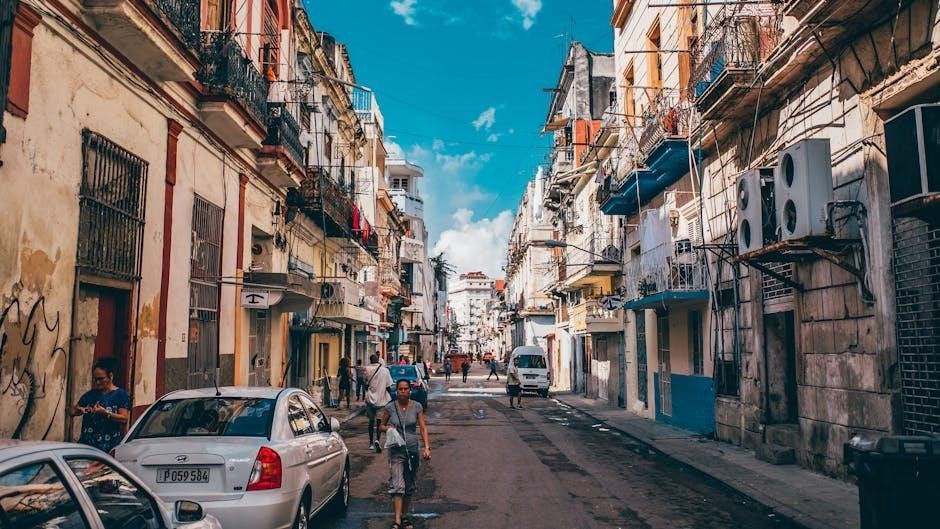normas aduaneras de cuba 2024 pdf
Overview of Cuban Customs Regulations 2024
The 2024 Cuban Customs Regulations outline updated norms for imports and exports, emphasizing streamlined procedures, enhanced documentation requirements, and clarified restrictions on specific goods, ensuring compliance with international standards.
The Normas Aduaneras de Cuba 2024, outlined in official documents, provide a comprehensive framework for customs procedures, ensuring compliance with international trade standards. These norms regulate the import and export of goods, detailing classification systems, documentation requirements, and restrictions on specific items. They aim to streamline processes, reduce bureaucracy, and enhance transparency. The regulations are available in PDF format, offering detailed guidelines for individuals and businesses engaged in international trade with Cuba. They also emphasize the importance of adhering to legal requirements to avoid penalties and ensure smooth customs operations.
1.2. Key Updates and Changes in the 2024 Regulations
The 2024 updates to Cuba’s customs norms introduce streamlined procedures for imports and exports, enhancing efficiency and reducing bureaucratic hurdles. New regulations clarify restrictions on sensitive goods and introduce stricter documentation requirements. Additionally, there are updated provisions for temporary import and export regimes, as well as revised rules for e-commerce transactions. These changes aim to modernize customs operations, align with international trade practices, and improve transparency for individuals and businesses engaging in trade with Cuba.
General Provisions of Cuban Customs Norms
Cuban customs norms establish a regulatory framework for imports and exports, outlining procedures, documentation requirements, and legal obligations for compliance with national and international trade standards.

2.1. Definition of Customs Regimes and Procedures
Cuban customs regimes define the legal frameworks governing the movement of goods, including import, export, and temporary admission. Procedures involve compliance with norms, documentation, and adherence to specific customs clearance processes. These regimes ensure the proper classification and valuation of goods, while procedures streamline operations for importers and exporters, guaranteeing adherence to national and international trade regulations.
2.2. Classification of Goods and Tariff Codes
The classification of goods under Cuban customs regulations is based on standardized tariff codes, ensuring accurate identification and valuation. These codes, aligned with international systems, determine import duties and compliance requirements. Proper classification is essential to avoid delays or penalties, as it directly impacts the application of tariffs and trade restrictions. The 2024 norms emphasize the importance of precise categorization to facilitate smooth customs processing and ensure adherence to legal and regulatory standards.
2.3. Responsibilities of Importers and Exporters
Importers and exporters must ensure accurate classification of goods, submit complete documentation, and comply with all Cuban customs regulations. They are responsible for maintaining detailed records for at least five years and reporting any changes in goods’ status. Compliance with both Cuban and international trade laws is mandatory. Failure to meet these obligations may result in penalties, emphasizing the importance of strict adherence to customs norms and procedures. Proper record-keeping and transparency are critical to avoiding legal issues.
Prohibited and Restricted Items
Cuban customs regulations prohibit the import/export of firearms, narcotics, and certain cultural goods without authorization. Restricted items, like sensitive technologies, require special permits and rigorous documentation for clearance.
3.1. List of Prohibited Goods for Import and Export
The 2024 Cuban customs regulations prohibit the import and export of firearms, narcotics, and certain cultural goods without proper authorization. Sensitive technologies and military equipment are also restricted. Prohibited items include hazardous materials, counterfeit goods, and protected wildlife products. The regulations emphasize strict penalties for attempting to import or export these goods without prior approval. Violations may result in confiscation, fines, or legal action. It is essential to consult official customs norms for precise definitions and compliance requirements.
3.2. Special Permits and Licenses Required
Certain goods, such as cultural artifacts, high-tech equipment, and agricultural products, require special permits and licenses for import or export. These permits must be obtained from relevant Cuban authorities, ensuring compliance with customs norms. Failure to present valid documentation can result in delays, fines, or confiscation of goods. Importers and exporters must verify specific requirements for sensitive items to avoid penalties and ensure smooth customs processing.
Customs Procedures and Documentation
Customs procedures in Cuba require detailed documentation, including commercial invoices, bills of lading, and certificates of origin. Digital platforms now facilitate faster clearance, ensuring compliance with norms.
4.1. Required Documents for Customs Clearance
Customs clearance in Cuba requires specific documentation, including a commercial invoice, bill of lading, certificate of origin, and packing list. Personal effects must accompany a detailed inventory. Importers must present a valid tax ID and proof of payment of duties. For vehicles, a title and export permit are mandatory. Digital platforms now allow pre-submission of documents, streamlining the process. Ensure all paperwork aligns with Cuban norms to avoid delays. Compliance with these requirements is essential for smooth customs processing.
4.2. Step-by-Step Guide to Customs Declaration
The customs declaration process begins with registering as an importer/exporter. Submit all required documents, including invoices and certificates. Declare goods accurately, ensuring compliance with Cuban norms. A customs officer will review and inspect the shipment. Pay applicable duties and taxes. Once cleared, receive the release order. Digital platforms now facilitate pre-declaration, reducing wait times; Ensure all information is accurate to avoid delays or penalties. Stay updated on the latest regulations for a smooth process.
Recent Updates and Reforms in 2024
Cuban customs regulations for 2024 include streamlined procedures, updated documentation requirements, and new digital platforms for declarations, enhancing efficiency and compliance with international trade standards.
5.1. Simplification of Import and Export Processes
The 2024 updates introduced streamlined procedures for imports and exports, reducing bureaucratic hurdles. Digital platforms now facilitate online declarations, and priority lanes expedite clearance for low-risk shipments. Personal import limits have been increased, and certain goods no longer require extensive documentation. These reforms aim to enhance efficiency, reduce delays, and align Cuban customs with global trade standards, fostering a more business-friendly environment while maintaining regulatory oversight.
5.2. New Regulations on E-Commerce and Online Trade
The 2024 Cuban Customs Regulations include new provisions for e-commerce, simplifying online trade procedures. A tax exemption threshold for low-value imports has been introduced, reducing administrative burdens for small-scale digital transactions. Sellers must now provide detailed commercial invoices and customs declarations. These measures aim to regulate the growing e-commerce sector, ensuring compliance while fostering international trade. The reforms align Cuba’s digital trade practices with global standards, promoting efficiency and transparency in online business operations.
Export Regulations and Requirements
Cuba’s 2024 export norms require detailed documentation, including commercial invoices and customs declarations. Specific goods, like cultural or sensitive items, need additional permits to ensure regulatory compliance.
6.1. General Rules for Exporting Goods from Cuba
Exporting goods from Cuba requires adherence to specific customs regulations. All exports must be accompanied by accurate documentation, including commercial invoices and export declarations. Cuban authorities ensure compliance with international trade laws, verifying the origin and value of goods. Exporters must obtain necessary permits for restricted items, such as cultural or sensitive materials. Proper customs clearance is mandatory, and failure to comply may result in delays or penalties. The process emphasizes transparency and alignment with global trade standards.
6.2. Specific Requirements for Sensitive or Restricted Goods
Sensitive or restricted goods, such as weapons, cultural artifacts, and certain technologies, require special permits and licenses for export. Documentation must include detailed descriptions and proof of legal ownership. Customs authorities conduct rigorous inspections to ensure compliance with export bans and international sanctions. Additional approvals from regulatory agencies may be necessary. Failure to meet these requirements can result in confiscation, fines, or legal action. Exporters must ensure all sensitive goods align with Cuba’s legal and international trade obligations.

Special Customs Regimes
Cuba’s 2024 customs norms include temporary import/export regimes, re-export, and transit of goods. Special deposit systems and simplified procedures facilitate compliance with international trade standards and local regulations.
7.1. Temporary Import and Export Regimes
The 2024 Cuban customs norms establish specific regimes for temporary import/export of goods. These regimes allow for goods to be brought into or out of Cuba for specific purposes, such as repair, processing, or exhibition, with the obligation to re-export them within a defined timeframe. Documentation, including contracts and certificates, must be submitted to customs authorities. Compliance with these regulations ensures goods are not subject to duties or taxes, facilitating international trade while maintaining regulatory oversight.
7.2. Re-Export and Transit of Goods
The 2024 Cuban customs regulations detail procedures for re-exporting and transiting goods through the island. Re-export allows goods to be shipped to a third country after temporary import, while transit involves moving goods through Cuba without altering their customs status. Both processes require prior authorization and adherence to specific documentation requirements, such as commercial invoices and bills of lading. Customs authorities closely monitor these operations to ensure compliance, preventing unauthorized diversion or alteration of goods. This regime facilitates international trade while safeguarding Cuba’s economic interests.

Customs Compliance and Penalties
Non-compliance with Cuban customs regulations may result in fines, confiscation of goods, or legal action. Measures are enforced to prevent smuggling and fraud, protecting economic interests.
8.1. Consequences of Non-Compliance with Regulations
Non-compliance with Cuban customs regulations can result in severe penalties, including fines, confiscation of goods, and potential legal action. Individuals or businesses found violating norms may face bans on future import/export activities. Authorities enforce strict measures to deter fraud and smuggling, ensuring adherence to legal frameworks. Failure to comply can also lead to delays in customs clearance and additional financial burdens. It is crucial to consult official norms to avoid such consequences and ensure smooth operations.
8.2. Measures to Prevent Smuggling and Fraud
Cuban customs authorities have implemented robust measures to combat smuggling and fraud, including intensified inspections, use of advanced technology, and collaboration with international agencies. Stringent penalties are imposed for fraudulent activities, ensuring compliance with regulations. Enhanced documentation verification and cross-border data sharing further deter illicit practices. These measures safeguard legal trade and maintain the integrity of the customs system, protecting both the economy and consumers from illegal activities.

Digital Resources and Official Publications
The 2024 Cuban Customs Regulations are accessible in official PDF formats, providing detailed norms and updates. Digital platforms offer comprehensive guides, ensuring transparency and ease of access for users.
9.1. Access to Official Customs Norms in PDF Format
The official Cuban Customs Regulations for 2024 are available in PDF format, providing detailed norms and guidelines. Digital platforms offer easy access to these documents, ensuring transparency and compliance. Key publications include the “Compendio de Normas” and specific directives on import/export procedures. These resources are essential for understanding updated norms, including the 10,000 euro limit for personal imports and restricted goods lists, ensuring accurate adherence to current regulations.
9.2. Online Platforms for Customs Information and Updates
Official Cuban customs regulations and updates are accessible via digital platforms, offering streamlined access to norms and guidelines. The Cuban Customs website provides detailed resources, including downloadable PDFs and updated directives. Additionally, third-party applications and governmental portals offer real-time information on import/export procedures, restricted items, and compliance requirements. These platforms ensure transparency and facilitate adherence to the latest norms, making it easier for individuals and businesses to stay informed and compliant with customs regulations.

Future Outlook and Expected Changes
Cuba’s customs regulations are expected to undergo further modernization, with potential reforms focusing on digitalization and harmonization with international trade standards to enhance efficiency and compliance.
10.1. Anticipated Reforms in Cuban Customs Regulations
Anticipated reforms in Cuban customs regulations aim to enhance efficiency and compliance with global trade standards. These reforms are expected to include further digitalization of customs procedures, simplification of import/export processes, and updated norms to align with international agreements. Additionally, there may be efforts to modernize classification systems and improve transparency in customs operations. These changes are intended to facilitate trade while strengthening regulatory oversight to prevent fraud and smuggling.
10.2. Impact of International Trade Agreements on Customs Norms

International trade agreements significantly influence Cuban customs norms by promoting harmonization with global standards. These agreements often require Cuba to align its regulations with international practices, such as updating tariff codes and simplifying procedures. Digitalization of customs processes and adherence to WTO norms are key focuses. Additionally, trade pacts with regional blocs may lead to reduced tariffs and streamlined documentation, fostering easier trade flows while ensuring compliance with global security and fraud prevention standards.
